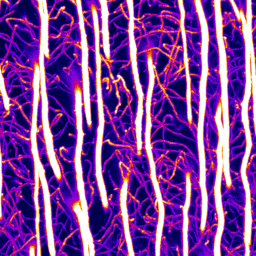- Share
- Share on Facebook
- Share on X
- Share on LinkedIn
Recruitment

In this project, we wish to define new strategies using AI to overcome current instrumental limitations in biomedical imaging for dentistry: achieving sub-micron resolution at the scale of a whole tooth to visualize cellular porosity. To address this challenge, we propose using deep-learning super-resolution (SR). This essentially involves training generative models on high- and low-resolution (HR/LR) data pairs to restore HR on images acquired much faster. In this study, we will test new SR models based on recent architectures for supervised and unsupervised learning, that could better capture the specificity of the porosity network in dentin in terms of topology and geometry. A secondary objective is to improve current Image Quality Assessment (IQA) metrics to better quantify SR efficiency.
We are currently looking for a student in Master 2 or final year of Engineering in one of the following fields: computer vision, biomedical engineering, optics, physics of complex systems, or applied mathematics with a solid training in Python programming, image processing and ideally machine learning. Your main tasks will be to test recent SR models, assess their performance and determine a minimal training data size.
This Master internship is expected to lay the ground for a PhD funded by the MIAI Chair GeoSuperRes, aiming to improve SR model design by leveraging on geometry and topology.
Download
2026_M2_NewSRModelsIQA.pdf (PDF, 209.44 KB)
Contact
Aurélien GOURRIER
OPTIMA team
aurelien.gourrier univ-grenoble-alpes.fr (aurelien[dot]gourrier[at]univ-grenoble-alpes[dot]fr)
univ-grenoble-alpes.fr (aurelien[dot]gourrier[at]univ-grenoble-alpes[dot]fr)
- Share
- Share on Facebook
- Share on X
- Share on LinkedIn